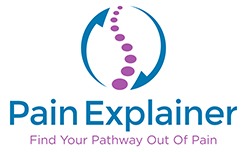Why Does
Chronic Pain
Wear Me Down?
Overview of Chronic Pain
Acute Pain is short-term pain that can potentially lead to chronic pain. It is physiologically different from chronic pain.
There are two well-defined (spinothalamic) pathways, chiefly concerned with pain and temperature sensations:
Everyone experiences occasional aches and pains. In fact, sudden pain is an important reaction of the nervous system that helps alert you to possible injury. When an injury occurs, pain signals travel from the injured area up your spinal cord and to your brain.

Pain will usually become less severe as the injury heals. However, chronic pain is different from typical pain.
With chronic pain, your body continues to send pain signals to your brain, even after an injury heals. This can last several weeks to years.
Chronic pain can limit your mobility and reduce your flexibility, strength, and endurance. This may make it challenging to get through daily tasks and activities.
Chronic pain is defined as pain that lasts at least 12 weeks.
The pain may feel sharp or dull, causing a burning or aching sensation in the affected areas. It may be steady or intermittent, coming and going without any apparent reason.
Chronic Pain can occur in nearly any part of your body. The pain can feel different in the various affected areas.
There are common types of Chronic Pain:
- Headache
- Postsurgical pain
- Post-trauma pain
- Lower back pain
- Cancer pain
- Arthritis pain
- Neurogenic pain (pain caused by nerve damage)
- Psychogenic pain (pain that isn’t caused by disease, injury, or nerve damage)
ReliefConnection.com
We are your CBD Connection. Seeking deep pain relief & support from the inside out? ReliefConnection.com is a trusted source for quality CBD products we believe can make a difference for people living with chronic pain and anxiety, seeking better sleep and supporting general wellness. Enter Code RELIEF10 for a discount at checkout!
Featured Resource

Million Americans with Chronic Pain
According to the American Academy of Pain Medicine, more than 1.5 billion people around the world have chronic pain. It is the most common cause of long-term disability in the United States, affecting about 100 million Americans.
The BIG THREE QUESTIONS everyone asks about
Chronic Pain
1. What Causes Chronic Pain?
Chronic or persistent and constant pain is generally caused by an initial physical injury, such as a back sprain or pulled muscle. It is believed that chronic pain develops after nerves become damaged. The nerve damage makes the pain more intense and long-lasting.
In these cases, treating the underlying injury may not resolve chronic pain.
In some cases, however, people experience chronic pain without any prior injury. The exact causes of chronic pain without injury are not well understood. The pain may sometimes result from an underlying health condition, such as chronic fatigue syndrome, characterized by extreme, prolonged weariness that is often accompanied by pain.
There are common causes of Chronic Pain:
Endometriosis: a painful disorder that occurs when the uterine lining grows outside of the uterus
Fibromyalgia: widespread pain in the bones and muscles
Inflammatory bowel disease: a group of conditions that causes painful, chronic inflammation in the digestive tract
Interstitial cystitis: a chronic disorder marked by bladder pressure and pain
Temporomandibular joint dysfunction (TMJ): a condition that causes painful clicking, popping, or locking of the jaw
Vulvodynia: chronic vulva pain that occurs with no obvious cause
2. Who is most at risk for chronic pain?

Chronic pain can affect people of all ages, but it’s most common in older adults. Besides age, other factors that can increase your risk of developing chronic pain include:
- Having an injury
- Having surgery
- Being female
- Being overweight or obese
3. How do I deal with Chronic Pain?
There is not a cure for chronic pain, but the condition can be managed successfully. It’s important to stick to your pain management plan to help relieve symptoms.
Physical pain is related to emotional pain, so chronic pain can increase your stress levels. Building emotional skills can help you cope with any stress related to your condition.
There are steps to reduce stress and reduce Chronic Pain:
Take good care of your body: Eating well, getting enough sleep, and exercising regularly can keep your body healthy and reduce feelings of stress.
Continue taking part in your daily activities: You can boost your mood and decrease stress by participating in activities you enjoy and socializing with friends. Chronic pain may make it challenging to perform certain tasks. But isolating yourself can give you a more negative outlook on your condition and increase your sensitivity to pain.
Seek support: Friends, family, and support groups can lend you a helping hand and offer comfort during difficult times. Whether you are having trouble with daily tasks or you’re simply in need of an emotional boost, a close friend or loved one can provide the support you need.

